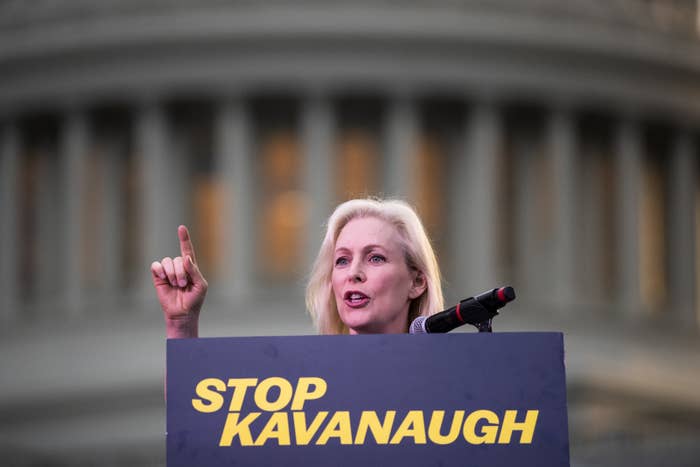
Kirsten Gillibrand announced in an interview that she is officially beginning a run for president.
"I'm filing an exploratory committee for president of the United States tonight," she told Stephen Colbert during a Tuesday taping for The Late Show With Stephen Colbert.
"I'm going to run for president of the United States because as a young mom, I'm going to fight for other people's kids as hard as I would fight for my own," she said. She specifically mentioned health care (which she said "should be a right and not a privilege"), improving public education, job training, and taking on interests that stand in the way of progress.
"You are never going to accomplish any of these things if you don't take on the systems of power that make all of that impossible, which is taking on institutional racism. It's taking on the corruption and greed in Washington, taking on the special interests that write legislation in the dead of night," she said. "And I know that I have the compassion, the courage, and the fearless determination to get that done."
TONIGHT: @SenGillibrand stops by @colbertlateshow to announce that she is forming an exploratory committee to run for President of the United States! #LSSC
Gillibrand will start her campaign Wednesday morning in Troy, New York, near where she grew up and where her campaign will be headquartered, according to her campaign. She will then kick off a trip to Iowa this coming weekend. A campaign website paid for by her exploratory committee went live soon after CBS released the clip from her interview with Colbert.
Gillibrand, a third-term New York senator, is one of several Democrats who have already taken steps to run against President Donald Trump in 2020, a field that’s expected to grow substantially in the coming months. But she's expected to center her campaign on the women's issues that have been the signature of her career, focusing more on gender than other candidates will.
Known for a longstanding commitment to victims of sexual assault, particularly women in the military, Gillibrand, 52, is likely to present herself in part as a candidate of the #MeToo era.
She was the first Democrat to publicly call for the resignation of former senator Al Franken in the wake of sexual misconduct allegations against him in 2017 — a move that earned her the ire of some Democratic donors — and was among the first Democrats to say in 2017 that she thought former president Bill Clinton should have left office after his own sexual misconduct allegations.
When she called publicly for Trump to resign in 2017 because of allegations of sexual misconduct, Trump responded with a sexist attack, tweeting that Gillibrand “would do anything” for donations.
This past Saturday, Gillibrand met with a group of about 20 influential women of different generationaexl, professional, and racial backgrounds, signaling she would run and telling them she would need their help. Gillibrand is already not the only woman to begin a run for the White House; Sen. Elizabeth Warren announced an exploratory committee at the end of December, and Rep. Tulsi Gabbard said last week that she had decided to run. But Gillibrand is expected to make gender more central to her campaign than Warren, Gabbard, or other women who are likely to join the primary, like Kamala Harris.
Since Trump’s election, Gillibrand has cultivated the most starkly anti-Trump record of any senator, according to a tracker by FiveThirtyEight, voting against most of Trump’s nominees, including many that garnered widespread Democratic support. And she has come out in favor of a slew of progressive policies, like a single-payer Medicare for All health care system and tuition-free college.
In 2018, Gillibrand called for abolishing the Immigrations and Customs Enforcement agency — a position even many Democrats have avoided taking. But as a congresswoman from upstate New York, where she represented a right-leaning district before being appointed to fill Hillary Clinton's Senate seat in 2009, Gillibrand has had a record that is far more moderate. She has voted against progressive immigration policies like amnesty and sanctuary cities, and in favor of gun rights — receiving an "A" rating from the National Rifle Association during her 2007–2009 term.
Gillibrand has since said she has evolved on both issues, saying she is “embarrassed” by her past positions, but they could create friction in a Democratic primary that is likely to involve tests of progressive credentials, especially on issues of gun rights and immigration.
